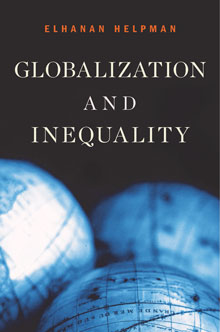Book Reviews
Grounding the Debate
Elhanan Helpman
Globalization and Inequality
Harvard University Press, Cambridge, MA, 2018, 232 pp., $26.95
The rise of globalization and income inequality are two defining trends of our time. Since the beginning of the 19th century, the volume of global trade has increased dramatically, and in the past few decades several firms have globalized their production processes through offshoring and outsourcing. At the same time, within-country inequality in income has risen substantially in several countries, and particularly in the United States. Are these trends linked? Indeed, the recent backlash against globalization and international trade is to some extent based on the presumption that they have caused job losses and higher income inequality.
Not so fast, argues Elhanan Helpman in Globalization and Inequality. Although globalization may have affected inequality through a variety of channels, the overwhelming finding of recent research, he argues, is that this impact has been quantitatively small, meaning that we have to look elsewhere for the chief culprit in rising inequality. Helpman develops this point in a highly readable book that traverses three decades of theoretical and empirical research on international trade.
The book starts with a review of studies based on the factor proportions theory, the traditional lens economists use when thinking about the effects of globalization. According to this view, the progressive removal of barriers to international trade in developing economies has raised the price of goods whose production relies more on highly skilled labor, resulting in larger wage gaps between high- and low-skilled workers in rich countries. While this mechanism is plausible in theory, the empirical evidence suggests that the magnitude of the effect is rather small and that other subsidiary implications of the theory are not supported either.
In response to this failure, recent research has considered other mechanisms linking globalization and inequality. Helpman illustrates in a rigorous yet accessible way how the matching process between workers and firms, the survival and growth of different types of firms, and technological change may have been affected by international trade, therefore shaping inequality. The studies reviewed in this book are extremely rich and diverse in terms of theoretical sophistication, data, and empirical methodology—and their systematic categorization and discussion are perhaps the most valuable contribution of the book. Many of these lines of work are in their infancy, and Helpman acknowledges that conclusions are inevitably tentative at this point. However, the available evidence does not support the view that globalization is to be blamed for the increase in inequality.
The recent policy debate on the labor market consequences of international trade is ideological, vague, and ill-informed. In such an environment, economists have the important mission of disseminating key findings from rigorous research and helping to ground the debate on data and logical reasoning. This book, written by one of the most prominent globalization scholars, is one essential attempt in that direction.
Opinions expressed in articles and other materials are those of the authors; they do not necessarily reflect IMF policy.








